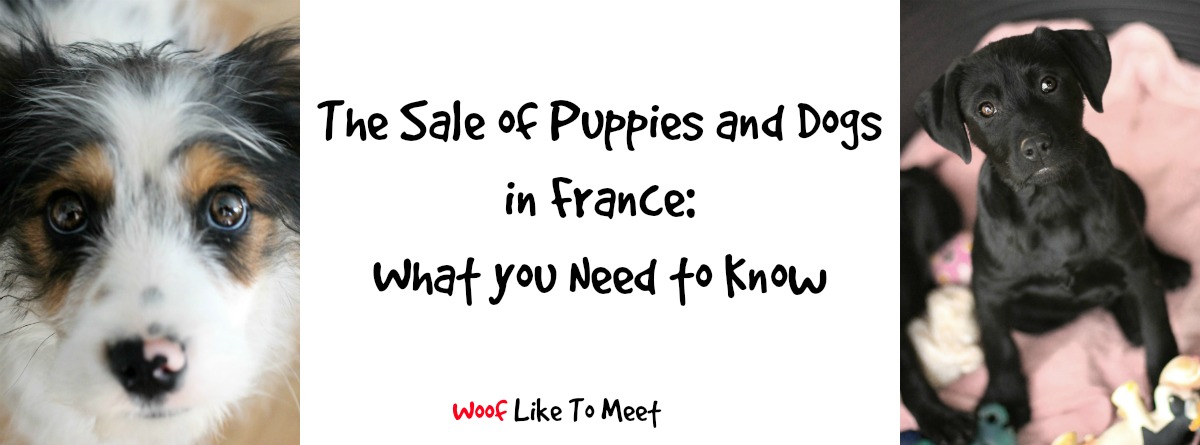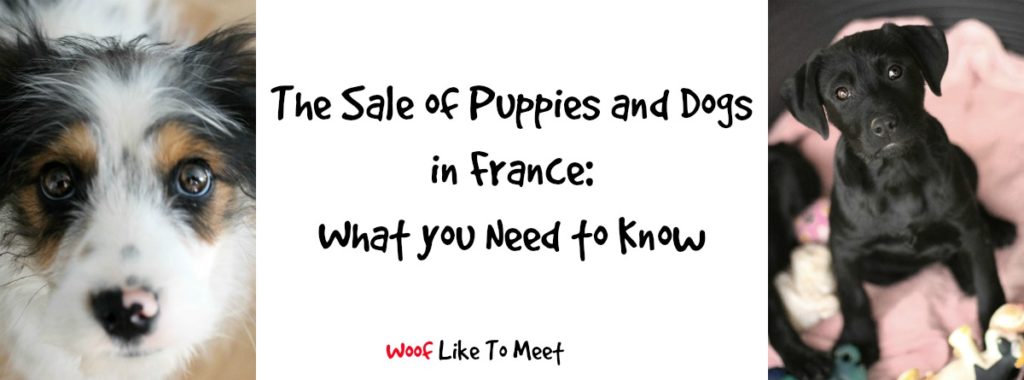Edit: this post was updated in November 2021 to reflect new laws.
Since January 2016, laws have been in place regarding the advertisement and sale of dogs (and cats). This includes details about puppies too (and kittens!). In fact, laws and requirements have been in place for some time regarding identification. But, for the first time, animal welfare groups joined forces with vets and breeders to help the French government create a law that would put a stop to the backyard breeding. Or at least give the authorities powers to put a stop to it. It’s not a perfect law, but it’s a law nonetheless.
So if you’re buying a puppy, what do you need to know?
You’ll find here details relating to pedigree puppy sales and other puppy sales. Then you’ll find further details about the purchase of adult dogs, about the conditions that exist when giving dogs away, and then conditions relating to adoption of an animal from a shelter.
Pedigree puppies
A puppy is considered a pedigree if four rules have been conformed to. You need to know these rules if you are looking to buy a pedigree puppy.
- BOTH of its parents are “LOF confirmé”. LOF means the “Livre des origines françaises”. This is essentially the French Kennel Club papers.
ONLY dogs with LOF papers have a right to be called a pedigree dog, or a “chien de race”.
However, pedigree is not granted automatically. All puppies that are born to LOF parents are LOF themselves. BUT…. they are not “LOF confirmé”.
To be confirmed, the dog needs to have seen a pedigree judge. This happens at different times in a dog’s life depending on their breed, A dog can be confirmed between ten months and fifteen months. This means a judge has agreed that your dog conforms to breed standards and is a good example of the breed.
There are specialist meetings for confirmation, and breeders must pay a price to do so. This means that you can’t slip a whippet X in as a Labrador LOF and breed from it.
A judge will know straight away that it is not a pedigree dog and it ensures breed standards are kept to. There are fees to do this.
These laws are more stringent than UK kennel club laws where a dog whose parents are one registered breed can be registered themselves and go on to breed with another registered dog and have puppies that have the right to be registered and so on. It can be confusing for people breeding dogs in France to understand this second confirmation before breeding. Of course you will see that these confirmation meetings are set so that people do not breed dogs that are too young. - The breeder has declared the mating. In French, this is called the “Déclaration de Saillie”. In the 8 weeks following a mating, the owner of the female must notify the Sociéte Centrale Canine in order to receive a certificate of mating. This is the first step in the process of ensuring breed standards are kept to. There are dossier fees to pay to get this document. If you try to do this after 4 months from the mating, the SCC will pay you a little visit. After 8 months, it is impossible to declare the mating and even if both parents are LOF confirmé, the puppies will not be. You can, of course, sell them as ‘type’ rather than ‘pure breed’.
- The breeder has registered the births of puppies. This must be done within two weeks of the birth.
- The breeder has asked for the litter to be registered. This can only be done once the puppies are microchipped or tattooed.
You’d expect such a breeder to have been on an ACACED training course and have a certificate to show this, to have solid understanding of the breed and to provide all these documents without asking. They are proud of their dogs. If you can’t see mum or dad, if you can see they have more than two or three different types of dogs, if they have multiple litters, if they are advertising on the internet… they’re probably missing some vital part of this. Anyone advertising their ‘type’ dogs online for the same price as dogs whose breeders have gone through these stages is no doubt profiting handsomely from your ignorance.
There are no laws to require breeders to undertake health checks for genetic diseases. However, a good breeder will have done these on both parents. To some degree, the confirmation of the parents will negate the need for French breeders to do this.
If the female animal is yours and you are selling her puppies, you are considered as a breeder. If the female animal is not yours and you are selling the puppies, you are considered as a seller.
Non-pedigree puppies
In this case, what you are buying is considered ‘type’. This is only an issue if you are being asked to pay pedigree prices and if you expect a pedigree puppy, or if you are buying a dog that is subject to breed specific legislation. If you don’t mind having a poodle that looks like a poodle but doesn’t have a pedigree, then go for it. There are plenty of people who have great dogs who are mixed breeds, or, indeed, who would prefer a mixed breed or one who just ‘looks like’ the dog breed they like but have no official claim on the title.
If your dog does not have LOF confirmé parents, they are just a ‘type’. They may have the best and most beautiful award-winning parents in the canine kingdom, but if they haven’t gone through the steps above, their puppies are ‘type’ not ‘race’ or pedigree.
Plenty of puppies slip through the net, it must be said, because their breeders have missed a vital part of the process, usually the declaration of mating, or a mating with a dog who is LOF, but not confirmed. Do not trust people who sell you a dog and say these papers are on the way.
For some ‘type’ dogs, you can apply to have your dog confirmed as a pedigree if they aren’t already. Say, for instance, that I pick up a beautiful whippet in the UK and I intend to breed her. She may not have pedigree paperwork if I don’t know where she came from or she wasn’t chipped. I can apply to have her confirmed LOF even though she has no paperwork. She can go to a show and a judge will say, ‘Yes, she is a marvellous version of a whippet’ and grant her a LOF confirmé status. You would need to make a demand via the Société Centrale Canine for an inscription “à titre initial” You need to do other things, like have tests for inherited diseases, pass tests for sociability, behaviour or aptitude, and be judged as of the highest quality by an expert judge. But it’s possible in certain cases if the breed is considered to be an ‘open book’ breed.
You can, of course, do this even if you have no intention to breed, if you wanted to show them, or you just wanted to say what a marvellous example of a breed you have.
That is IF the SCC are accepting ‘new’ dogs to the pool or book, known as the livre in French. For many breeds, they’ll accept a new dog who just turns up and has all the characteristics of a pure race dog. This is a good thing to improve the gene pool and make sure it doesn’t become too limited.
BUT… the register is closed for certain breeds where there are a large number of dogs or where the dogs are subject to regulations. Since 1978, the register has been closed for German shepherds, Belgian shepherds, dobermann, boxers, fox terriers, dachshunds, springer spaniels, cocker spaniels, American cocker spaniels and poodles among others. That means, even if you have the most marvellous example of a German shepherd that you intend to breed from, it doesn’t make any difference. If you don’t have pedigree papers, they’re just a ‘type’ and it will always be so. You have no chance at all of ever breeding from that dog and the puppies being accepted as pure race.
The register has been closed since 1994 for American staffordshires, bull terriers and Staffordshire bull terriers. It is also closed for rottweilers (since 2001). That means if you own a ‘type’ American staffordshire, you have no chance at all of having it registered as a pedigree dog and no chance at all of removing the Category 1 restrictions.
And lovely as your ‘type’ cocker spaniel may be, it’s as muttley as the next dog. Not that I disapprove of that. But if you paid 50€ for a dog on the internet, you can call it a collie if you like, but it’s a muttley whatever it looks like. Likewise, there are breeders and sellers who sell puppies for €1500 or more on sales sites who count on you not caring that the dog is simply a ‘type’ and not a ‘pedigree’.
Selling a puppy: the law since January 2016.
In January 2016, the law regarding the sale of animals changed in France. This was to shut the door on backyard breeders making 1000€ from a litter of ‘type’ Yorkshire terriers that they’d sold on the internet for €200 – €1500 each.
Make no bones about it: for the government it’s a financial decision. This is a black market and therefore there is tax to be raised from it. These are fiscal obligations and are followed up by the tax authorities.
By closing the door on backyard breeders, they are making sure nobody is pocketing a sneaky couple of thousand a year on the sly. Or more. The breeder we shut down in Juillaguet in March 2014 had 160 dogs on site, few of them registered. To sell them on the internet for 150€ a dog, you can imagine how much back tax she owed!
For breeders, the new law just makes it even more restrictive for unsavoury types to get involved. It gives breeders prestige and limits competition from those people who want to buy a yorkie. They’re no longer being undercut and the breed standard is maintained.
From an animal welfare point of view, it helps us stop backyard breeders and allows us to trace and track dogs more efficiently. In theory. In practice, some of those against the law predicted that we’d be inundated by litters that people could no longer sell. In reality, it’s not been any worse or any better this year for puppy litters than any other. We had the beagles thrown in the Charente that was obviously linked to the limitations on selling, but five years after these rules came into play, there has not been an increase in the number of puppies surrendered as a result of these more restrictive rules.
What the January 2016 law says about selling animals
Anyone who sells a dog or cat if they own the mother is considered a breeder. To be a breeder, you must register at the Chambre d’Agriculture. You can get a dispensation from the Chambre d’Agriculture if you want to sell a litter a year.
If you sell more than a litter a year (and are therefore not a “hobby” breeder) you must also register with the departmental health authorities (DDPP or DDCSPP) so that you can have obligatory training, be taxed and be subject to site visits. You must have proof of ACACED training to be a breeder.
All dogs or cats (and puppies and kittens) must be microchipped or tattooed before being sold and the price must be displayed on the advert.
Normally, the law says that all dogs older than 4 months and all cats older than 7 months must be identified, but to sell, you will need to do it younger. Vets do this on tiny kittens of 700g at the refuge, so find a vet who will if yours is delaying and you want to sell your animals. You will receive a provisional certificate of identification from your veterinarian and you will be able to sell your animals. You are also responsible for ensuring that changes are updated on ICAD, the national database for identification information, within 8 days of the sale.
You must declare the sale on your tax return. (Told you… the governments will agree to anything if there is revenue for them!)
If you advertise your animal for sale you must:
- Mention the age of the animal and state whether it is LOF or not
- Give the number of its identification or that of the mother
- Say how many animals were in the litter
- Give the SIREN of the seller
If you sell your animal, you must also:
- have an “attestation de cession” – basically a transfer document that shows you have given the animal up. This should mention: the seller’s name and address, the name of the animal, its ID number, the date of the sale, the name and address of the person buying the animal, the sex, race, type of fur and colour of the animal, the animal’s date of birth, any distinguishing features, LOF details (if LOF) and LOF details of parents (if LOF) and the price of the sale. It should be done in duplicate and signed by both parties.
- have a document that explains to the buyer about how to care for the animal.
- have a copy of the provisional or actual ICAD document.
- have a health certificate from a vet for any animal over three months of age.
A health booklet is not necessary. You do not have to supply details of vaccinations as they are not obligatory. However, a good breeder will have a health booklet or “carnet de santé” for their puppies or dogs, cats or kittens.
If you buy a pedigree dog or “race”, you should get a birth certificate for the animal from the SCC.
You can see why breeding should really be left to people who know what they are doing.
You will also notice that shelters will have a contract for you to sign that includes much of the information. That’s why our dogs and cats leave vaccinated, with a health booklet, and identified. It’s why we stress that our fees are not to “buy” the animal but to cover the costs incurred. It is an adoption fee. However, such documents are legally and fiscally considered sales documents and shelter contracts must contain the same information. Likewise, any adverts should follow the same guidance.
Free to a good home
Ahhhh, don’t get me started. Even if you offer kittens or puppies as ‘free’ to get around the law, you STILL need to identify them. That is the law. Maybe the 50€ microchip cost puts people off, but it also means that anyone who has to pay 400€ to identify a litter of accidents just might think about sterilising their animal (or keeping them out of harm’s way if they’re in season)
It is not difficult to keep an in-season dog away from others. Thousands of breeders do it every year to give their females a rest between litters. Even if you have dogs in the home who live together, you’ll find breeders using kennels with secure facilities to ensure there are no accidents.
Ultimately, the ‘accidents’ need to stop. People need to be more responsible about their animal’s reproduction. If you can’t be good, be careful, as my Grandmother says.
It is not a myth that these ‘free’ dogs end up in shelters, or lost on the lam, or much, much worse. Where do you think the 350 unidentified dogs that the pound picks up every year in North West Charente come from?
They are free dogs. They were given away to neighbours. They were passed on to strangers in carparks.
They are not registered dogs, on the whole. And if they are, we can often get in touch with breeders who come and pick up their pedigree dogs to rehome themselves.
Responsible breeders are not causing shelter problems.
Backyard breeders selling dogs for €150 or €1500 on the internet are.
Irresponsible owners who don’t take precautions when their female is in season or their intact male is free to roam the streets are a massive contributing factor.
In January 2021, the French deputies have added a clause to say that pet shops will no longer be able to sell dogs and cats. This law excludes certain types of animal, including hunt hounds, and does not include small animals known as NAC, or les nouveaux animaux de companie which includes animals like hamsters, guinea pigs and rabbits. This law will come into place in January 2024. Discussions relating to animal welfare and the use of animals in circuses, keeping whales and dolphins, the trade of exotic animals, raising animals for fur and the sale of dogs and cats in pet shops were controversial and amendments may yet be made. However, this is unlikely to affect small breeders in France who want to sell puppies or kittens.



